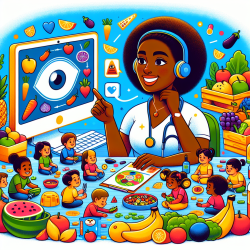Introduction
As a speech-language pathologist, the ability to integrate findings from various fields into practice can significantly enhance therapeutic outcomes. One such area of interest is the relationship between diet and health, as highlighted by the CARDIO2000 study. This research provides compelling evidence on how the consumption of fruits and vegetables can reduce the risk of acute coronary syndromes. While this may seem distant from speech-language pathology, the underlying principles of health and wellness are universally applicable, especially in pediatric populations.
Understanding the CARDIO2000 Study
The CARDIO2000 study, a case-control research conducted in Greece, explored the association between fruit and vegetable consumption and the risk of developing acute coronary syndromes (ACS). The study concluded that higher intake of fruits and vegetables significantly lowers the risk of ACS. Specifically, individuals consuming five or more servings of fruit per day had a 72% lower risk of coronary heart disease (CHD), while those consuming vegetables more than three days a week had a 70% lower risk.
Implications for Speech-Language Pathology
While the CARDIO2000 study focuses on cardiovascular health, its implications for speech-language pathology, particularly in children, are noteworthy. Nutritional intake is crucial for brain development and cognitive function, both of which are foundational for speech and language development. Here are ways practitioners can integrate these insights:
- Advocate for Balanced Nutrition: Encourage parents to provide a diet rich in fruits and vegetables, which supports overall cognitive and physical health, potentially enhancing speech and language outcomes.
- Collaborate with Nutritionists: Work alongside nutritionists to develop comprehensive care plans that address both dietary and speech-language needs.
- Educate Families: Use evidence from studies like CARDIO2000 to educate families about the broader impacts of diet on health and development.
Encouraging Further Research
While the CARDIO2000 study offers valuable insights, there is a need for further research to explore the direct impact of diet on speech and language development. Practitioners are encouraged to engage in interdisciplinary research, contributing to a more holistic understanding of child development.
Conclusion
Integrating dietary insights into speech-language pathology practice can enhance therapeutic outcomes for children. By advocating for a balanced diet and collaborating with other healthcare professionals, practitioners can contribute to the overall well-being of their clients. For more detailed information, consider reviewing the original research paper: Consumption of fruits and vegetables in relation to the risk of developing acute coronary syndromes; the CARDIO2000 case-control study.










